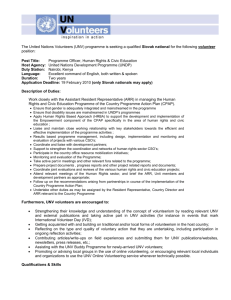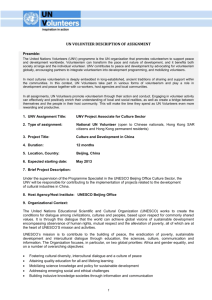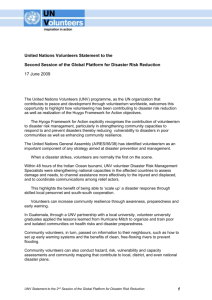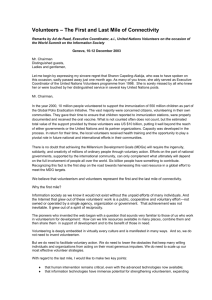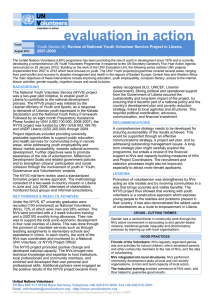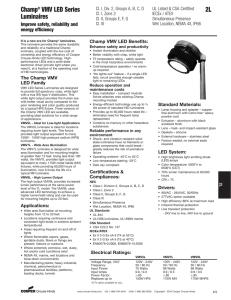Youth Series - United Nations Volunteers
advertisement
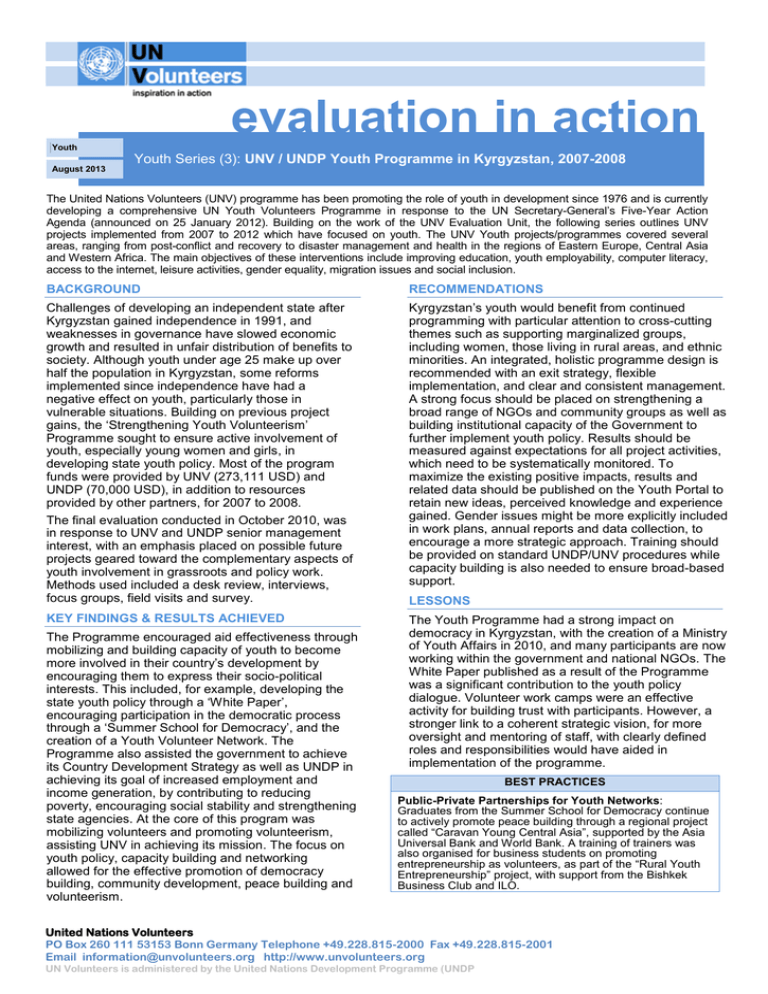
evaluation in action Youth Youth Series (3): UNV / UNDP Youth Programme in Kyrgyzstan, 2007-2008 August 2013 The United Nations Volunteers (UNV) programme has been promoting the role of youth in development since 1976 and is currently developing a comprehensive UN Youth Volunteers Programme in response to the UN Secretary-General’s Five-Year Action Agenda (announced on 25 January 2012). Building on the work of the UNV Evaluation Unit, the following series outlines UNV projects implemented from 2007 to 2012 which have focused on youth. The UNV Youth projects/programmes covered several areas, ranging from post-conflict and recovery to disaster management and health in the regions of Eastern Europe, Central Asia and Western Africa. The main objectives of these interventions include improving education, youth employability, computer literacy, access to the internet, leisure activities, gender equality, migration issues and social inclusion. BACKGROUND RECOMMENDATIONS Challenges of developing an independent state after Kyrgyzstan gained independence in 1991, and weaknesses in governance have slowed economic growth and resulted in unfair distribution of benefits to society. Although youth under age 25 make up over half the population in Kyrgyzstan, some reforms implemented since independence have had a negative effect on youth, particularly those in vulnerable situations. Building on previous project gains, the ‘Strengthening Youth Volunteerism’ Programme sought to ensure active involvement of youth, especially young women and girls, in developing state youth policy. Most of the program funds were provided by UNV (273,111 USD) and UNDP (70,000 USD), in addition to resources provided by other partners, for 2007 to 2008. The final evaluation conducted in October 2010, was in response to UNV and UNDP senior management interest, with an emphasis placed on possible future projects geared toward the complementary aspects of youth involvement in grassroots and policy work. Methods used included a desk review, interviews, focus groups, field visits and survey. Kyrgyzstan’s youth would benefit from continued programming with particular attention to cross-cutting themes such as supporting marginalized groups, including women, those living in rural areas, and ethnic minorities. An integrated, holistic programme design is recommended with an exit strategy, flexible implementation, and clear and consistent management. A strong focus should be placed on strengthening a broad range of NGOs and community groups as well as building institutional capacity of the Government to further implement youth policy. Results should be measured against expectations for all project activities, which need to be systematically monitored. To maximize the existing positive impacts, results and related data should be published on the Youth Portal to retain new ideas, perceived knowledge and experience gained. Gender issues might be more explicitly included in work plans, annual reports and data collection, to encourage a more strategic approach. Training should be provided on standard UNDP/UNV procedures while capacity building is also needed to ensure broad-based support. KEY FINDINGS & RESULTS ACHIEVED The Youth Programme had a strong impact on democracy in Kyrgyzstan, with the creation of a Ministry of Youth Affairs in 2010, and many participants are now working within the government and national NGOs. The White Paper published as a result of the Programme was a significant contribution to the youth policy dialogue. Volunteer work camps were an effective activity for building trust with participants. However, a stronger link to a coherent strategic vision, for more oversight and mentoring of staff, with clearly defined roles and responsibilities would have aided in implementation of the programme. The Programme encouraged aid effectiveness through mobilizing and building capacity of youth to become more involved in their country’s development by encouraging them to express their socio-political interests. This included, for example, developing the state youth policy through a ‘White Paper’, encouraging participation in the democratic process through a ‘Summer School for Democracy’, and the creation of a Youth Volunteer Network. The Programme also assisted the government to achieve its Country Development Strategy as well as UNDP in achieving its goal of increased employment and income generation, by contributing to reducing poverty, encouraging social stability and strengthening state agencies. At the core of this program was mobilizing volunteers and promoting volunteerism, assisting UNV in achieving its mission. The focus on youth policy, capacity building and networking allowed for the effective promotion of democracy building, community development, peace building and volunteerism. LESSONS BEST PRACTICES Public-Private Partnerships for Youth Networks: Graduates from the Summer School for Democracy continue to actively promote peace building through a regional project called “Caravan Young Central Asia”, supported by the Asia Universal Bank and World Bank. A training of trainers was also organised for business students on promoting entrepreneurship as volunteers, as part of the “Rural Youth Entrepreneurship” project, with support from the Bishkek Business Club and ILO. United Nations Volunteers PO Box 260 111 53153 Bonn Germany Telephone +49.228.815-2000 Fax +49.228.815-2001 Email information@unvolunteers.org http://www.unvolunteers.org UN Volunteers is administered by the United Nations Development Programme (UNDP
